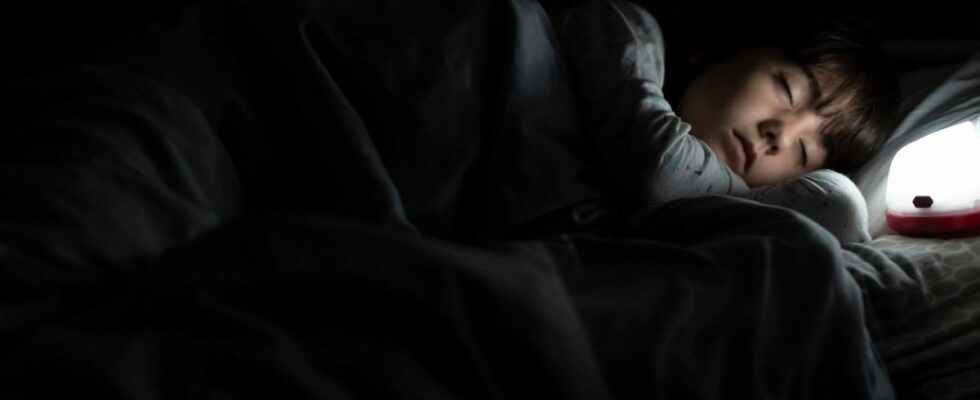Published ,
Reading 2 mins.
Sleeping with a light, even dimmed, would interfere with sleep and cause health problems according to a new study. Doctor Liath Guetta, sleep doctor and member of Doctissimo’s expert committee, nevertheless wants to be reassuring.
We know that light, especially blue light emanating from screens (television, smartphone, computer, etc.) is harmful, especially before going to bed. It is for this reason that it is recommended to avoid exposure to screens at least 2 hours before falling asleep. But a recent study judges that sleeping with a light, even subdued, would be harmful. However, Doctor Liath Guetta, sleep doctor and pulmonologist, wants to be reassuring about the results of this study.
Light and sleep, what links according to this study?
During sleep, the heart rate decreases so that the body rests and regenerates. When the bedroom is lit at night, the rhythm of the heart does not slow down enough, or even accelerates. However, a high heart rate has been shown to be a risk factor in the potential occurrence of heart disease.
On the other hand, the results of the new study from Northwestern Medicine show that the body resists insulin in a room that is not dark enough. This hormone, secreted by the pancreas, causes a rise in blood sugar levels, forcing the organ to overproduce. Over time, the pancreas can no longer make insulin, making the person’s body more resistant, which can lead to the onset of type 2 diabetes. Light at night could also promote the taking of weight and therefore obesity.
Exposure to light during nocturnal sleep could therefore slightly increase the risk of heart disease and diabetes, since the regulatory functions of the cardiovascular and glycemic systems are altered. However, for Doctor Guetta, a sleep specialist, “we must be reassured, because certainly too much light during sleep reduces the rate of production of melatonin, but does not cause a change in the health prognosis”.
Are the consequences the same in case of low light at night?
Doctor Phyllis Zee’s team recruited 20 healthy individuals in their twenties. For two nights, the participants slept in the sleep laboratory. While sleeping, they were exposed to light of 3 lux (low brightness) and 100 lux (moderate brightness). The goal was to find out if even a small amount of light affected metabolism.
Various measures have been recorded, in particular their “respiration, heart rate, electrocardiogram, and we also took blood samples from them to measure melatonin levels while they slept.”explains the research director.
It turns out that even a tiny amount of light passing through the sleeping person’s closed eyelids created a small sleep deficit linked to an increase in heart rate and alterations in cell renewal in particular.
Consult a therapist online
Reducing the brightness in the bedroom is important. Nevertheless, according to Doctor Guetta, “even though it’s better to sleep in total darkness, many people can’t or don’t like to sleep in total darkness”. She therefore advises such people “to avoid screens, to lower the shutters”. On the other hand, for sleeping in the dark to be “acceptable in terms of anxiety”it recommends the use of “very very weak light, from a night light placed on the ground and not facing the eyes or a small clip-on night light plugged into a socket, as for children”.
According to her, it is, in fact, much more beneficial for health to sleep properly, even with very dim light, than to be anxious in the dark.
